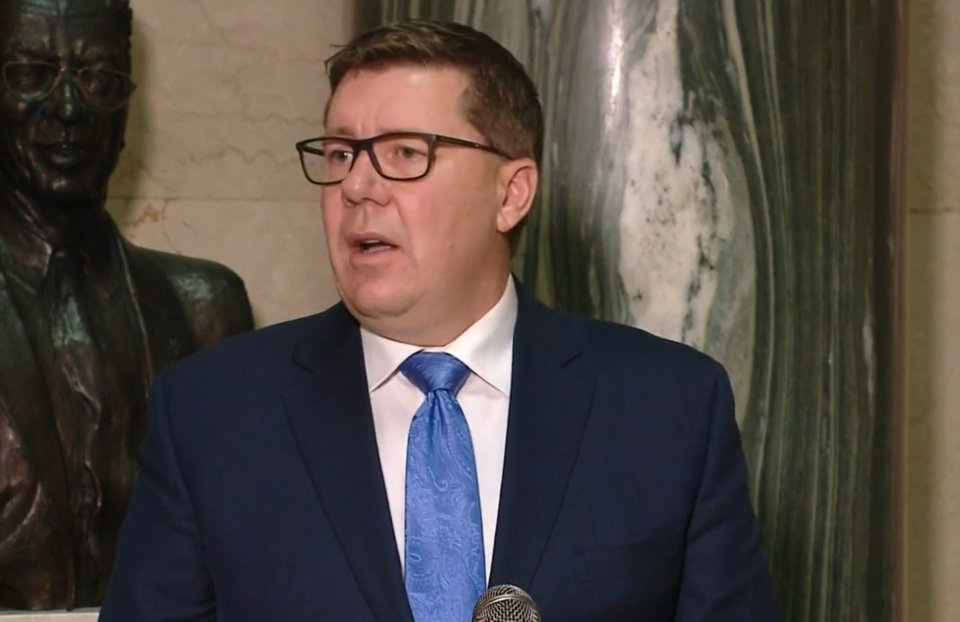REGINA — Saskatchewan’s premier and top doctor are offering a conflicting message about the value of gathering limitations, as Saskatchewan residents are bombarded with a fifth wave of COVID-19 transmission.
Premier Scott Moe and Chief Medical Health Officer Dr. Saqib Shahab both spoke during a press conference on Jan. 12, where the current public health orders were extended until Feb. 28.
The two top officials addressed questions about the province’s current plan to handle the fast-rising number of COVID-19 cases sweeping the province, offering a sometimes inconsistent message about what measures are needed right now.
No new restrictions were announced during the appearance, which Moe said is because the government feels mitigating measures like lockdowns would not necessarily be effective at this time.
“There’s going to be interruptions and we should expect that there are going to be interruptions over the course of the next number of weeks,” said Moe. “We’re making the decision to not interrupt everybody for an extended period of time.”
Moe called lockdowns and gathering limits “an infringement on the rights and personal freedoms we have come to enjoy and value as Canadians.”
He said the measures are not currently on the table as the provincial government feels gathering lockdowns have not worked in other provinces.
“At times, they have been effective during previous waves that we’ve faced,” said Moe. “But it's now clear, at least in the Omicron wave of the pandemic, that a lockdown policy can cause harm in our communities, often with little or no benefit.”
Moe said implementing restrictions on public and private spaces is detrimental to the economy and the mental well being of communities, including schools.
“There are consequences to that, that are unbeknownst to us at this time,” said Moe.
Instead, Moe once again encouraged Saskatchewan residents to get vaccinated with the recommended three doses, and continue to monitor themselves using rapid test kits at home.
“This is the path we have chosen and we’re going to continue to move forward in this province to provide all the tools available so that individuals and families can do their own personal risk assessments,” said Moe.
In his commentary, however, Shahab explicitly asked residents to avoid gathering together for at least the next two to four weeks, to help round off the transmission curve from its current sharp incline.
“I’m saying very clearly, minimize your non-school, non-work contacts,” said Shahab. “Try not to have that gathering, push things back maybe towards March or April.”
The province’s top medical expert described the Omicron variant, identified as the predominant strain in Saskatchewan now, as five to 10 times more transmissible than the previous Delta variant, which drove the fourth wave in the fall.
“I think we all agree we are in an entirely different phase of the pandemic now, something that’s fundamentally very different from the previous four waves,” said Shahab.
He said that while Omicron symptoms have been appearing milder than previous strains, case data is still preliminary and there is still a high risk of hospitalization in those who are not fully vaccinated.
Shahab also said that case numbers shared via the province’s dashboard data will “not be [an] informative” measure of the virus’s presence moving forward, as the decrease in PCR testing may be capturing as little as 10 per cent of cases in some areas.
“We will have to rely more on the lagging indicator of hospitalizations,” said Shahab, who has previously said hospitalization data typically trails behind case data by at least two weeks.
With the more transmissible strain, he estimated Saskatchewan could see five to 10 times more cases than in previous waves, potentially over the next several months.
The chief medical health officer would not definitely say whether he felt a public health order enforcing gathering limits was necessary, but strongly encouraged residents to limit their contacts voluntarily.
He also noted that while rapid testing can be useful for regular check-ins at home, there is a 30 per cent margin of error attached to the kits.
“The rapid antigen test may be negative and you still may have COVID,” said Shahab.
Shahab urged residents to be diligent in keeping an eye out for potential symptoms, wearing a well-fitting face mask while near others and avoiding non-essential gatherings.
“I would say that maybe right now, one or two out of every 100 people have Omicron and are transmitting it without even knowing,” said Shahab. “I think that number is going to be going up in the next few weeks, to one out of 50 people next week and one out of 25 people and so on.”
When asked why the government has not implemented gathering limits despite the clear stance from the chief medical health officer that limiting contact is a necessary action, Moe said that he believes Saskatchewan residents are capable of making their own decisions when processing the advice of officials.
“They should trust themselves,” said Moe. “We are asking Saskatchewan people to use their judgment, when they do feel it is necessary to come together.”
Saskatchewan is the only province in the country that remains without some type of gathering limits at this time.
The premier also said that he is not considering implementing a “vax tax,” like the announcement earlier this week by Quebec Premier François Legault that unvaccinated individuals will be subject to a substantial fine in the future.
Residents are being encouraged to skip official PCR testing at public health clinics unless absolutely necessary, in order to preserve the capacity of the healthcare system.
Moe and Shahab said more details regarding the province’s surge plan to address potentially incoming staffing shortages will be shared by the Provincial Emergency Operations Center during an update on Thursday.
Saskatchewan reported 1,084 new positive cases of COVID-19 today, on 3,591 tests, for a test positivity rate of 30 per cent.



